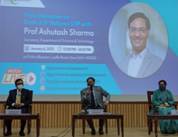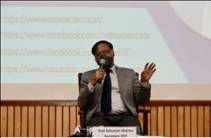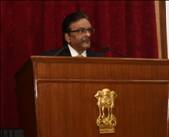“The aim of draft STIP will be to create an end to end science, technology and innovation ecosystem, which is inclusive and brings equal benefits to all stakeholders in the process”. Stating this at a press interaction on Draft STIP in New Delhi today, Secretary Department of Science and Technology, Professor Ashutosh Sharmahighlighted, “Times have changed with the future coming at us at a much faster pace. This policy will help us prepare for the fast pace of change. New problems are emerging that could only be tackled through science, technology, and innovation, and this policy is a right step in that direction to build a strong foundation for the future”.



Professor Sharma added that the policy has been prepared keeping in context that for India to march ahead on a sustainable development pathway to include economic development, social inclusion, and environmental sustainability for achieving an “Atmanirbhar Bharat”, a greater emphasis may be needed on promoting traditional knowledge systems, developing indigenous technologies and encouraging grassroots innovations. The emergence of disruptive and impactful technologies poses new challenges and, simultaneously, greater opportunities, he said.
The 5th National Science Technology and Innovation Policy finalized and available for public consultation isguided by the broad vision of achieving technological self-reliance and positioning India among the top three scientific superpowers in the decade to come, to attract, nurture, strengthen and retain critical human capital through ‘people-centric’ science technology and Innovation Ecosystem.
The policy drafted through a4 track process of consultation aims to bring about profound changes through short, medium, and long-term mission mode projects by building a nurtured ecosystem that promotes translational as well as foundational research and innovation among both individuals and organizations in alignment with global standards.
The objective of the draft policy is to identify and address the strengths and weaknesses of the Indian STI ecosystem to catalyse the socio-economic development of the country and also make the Indian STI ecosystem globally competitive. It aims to foster, develop, and nurture a robust system for evidence and stakeholder-driven STI planning, information, evaluation, and policy research in India.
The policy, which was drafted as India and the world reorient in the present context of the COVID-19 crisis, seeks to establish a future-looking, all-encompassing open science framework to provide access to scientific data, information, knowledge, and resources to everyone in the country and all who are engaging with the Indian STI ecosystem on an equal partnership basis.
A National STI Observatory, as suggested in the policy, will act as a central repository for all kinds of data related to and generated from the STI ecosystem. It will encompass an open centralised database platform for all schemes, programmes, grants, and incentives existing in the ecosystem, and a dedicated portal will be created to provide access to the outputs of such publicly-funded research.
Science communication and public engagement is sought to be mainstreamed through the development of capacity building avenues through creative and cross-disciplinary platforms, research initiatives, and outreach platforms. Locally relevant and culturally-context-specific models will be developed too.
An India-centric Equity & Inclusion (E&I) charter will be developed for tackling all forms of discrimination, exclusions, and inequalities in STI leading to an institutional mechanism and an inclusive culture facilitated through equal opportunity for all marginalized groups. Strategies will be made to improve STI education, making it inclusive and more connected with the economy and society.
The policy creates case for doubling the number of Full-Time Equivalents (FTE) researchers, Gross Domestic Expenditure on R&D (GERD) and private sector contribution to the GERD every 5 years and to build individual and institutional excellence in STI with the aspiration to achieve the highest level of global recognition and awards in the coming decade.
Head STIP Secretariat and Adviser DST Dr. Akhilesh Gupta, presented a glimpse of the key features of the policy. He pointed out that the new policy, STIP, revolves around the core principles of being decentralized, evidence-informed, bottom-up, experts-driven, and inclusive. Also, it aims to bring in the concept of ‘dynamic policy’ with a robust policy governance mechanism incorporating features such as implementation strategy, periodic review, policy evaluation, feedback, and adaptation, and most importantly, a timely exit strategy for various policy instruments.
Dr. Gupta said, the process so far involved nearly 300 rounds of consultations with more than 40,000 stakeholders well distributed in terms of region, age, gender, education, economic status, etc. The STIP Secretariat was coordinated, supported, and guided by the Office of PSA, NITI Aayog, and DST, he said and added that the formulation process, by design, is envisioned as a very inclusive and participative model with intense interconnectedness among different tracks of activities.
Please click here for details of major recommendations.
The draft is placed for public consultation on DST’s website.
Suggestions, comments, and inputs on the draft policy may be shared by Monday the 25th January2021 on email: india-stip@gmail.com. The policy draft is available on https://dst.gov.in/draft-5th-national-science-technology-and-innovation-policy-public-consultation
*****
NB/KGS/(DST Media Cell)

